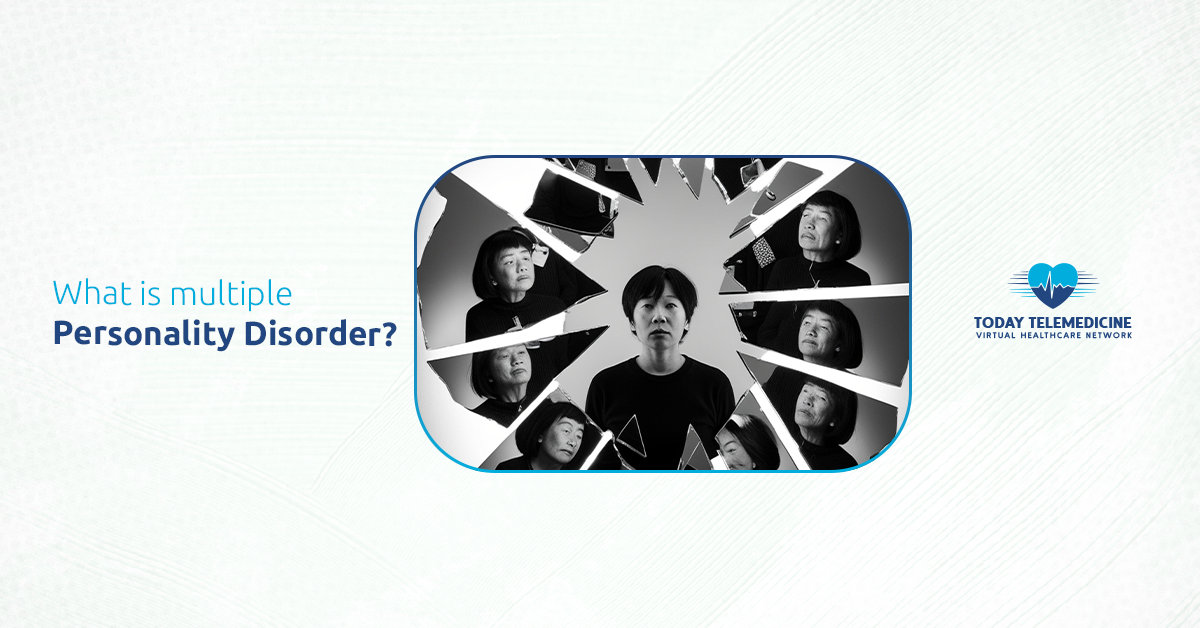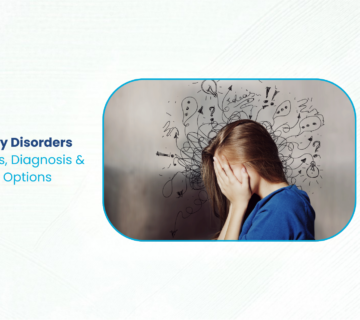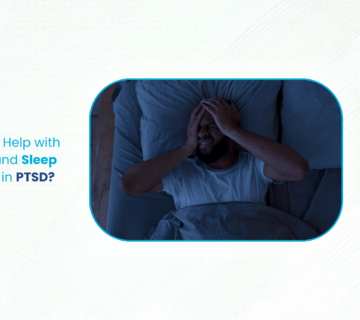Have you ever thought about being several individuals within one body? This experience defines a disorder termed Multiple Personality Disorder. Now, it is formally known as Dissociative Identity Disorder (DID). But what does it denote? Let’s explore what is multiple personality disorder in simple terms. We’ll learn how it affects people.
Are you confused about what is multiple personality disorder? At Today Telemedicine, we provide expert guidance and caring support. We aim to help you find balance amid shifting identities. Contact us today.
What Is Multiple Personality Disorder?
What is multiple personality disorder? It’s a mental health condition. A person has two or more different “identities” inside them. These identities can feel like separate people. Each one has its own thoughts, feelings, and sometimes even memories.
For instance, one identity might be calm and shy, while another could be loud and brave. These identities can switch in controlling how a person acts. Sometimes, a different identity is in charge. The person doesn’t remember what happened.
It often happens due to trauma, like a scary or painful event in the past. DID helps the brain protect itself from that pain.
Why Do People Develop DID?
DID typically stems from trauma, mainly during childhood. Suppose a kid faces severe hardships, such as abuse or neglect. In that case, their brain could develop varying identities to cope with it.
“Can trauma change your personality?” Indeed, it does. Trauma can reshape a person’s self-view and their reactions to their surroundings. For those with DID, trauma is incredibly severe. It’s like the brain splits the anguish into smaller pieces. These pieces evolve into distinct identities.
The brain has a process named dissociation. It’s as if it hits “pause” on hurting memories, storing them under separate identities.
What Are Shifting Identities?
A key marker of DID is a process known as shifting identities. This indicates that an individual’s distinct personas alternatively take the reins.
Imagine this: one minute a person could feel all grown-up; the next, feeling like a kid again. Their emotions might flip from total joy to sheer fear. These quick changes, or “shifts,” can happen without them realizing it.
Sounds, locations, or feelings can spur these alterations. People with DID often feel confused or afraid of these sudden shifts.
Is DID the Same as Bipolar Disorder?
Many people often mix up DID and conditions such as bipolar disorder. So, what’s the difference between bipolar and split personality?
Bipolar disorder is defined by mood changes. These swings include extreme highs and lows. Mania leads to intense joy, while depression causes deep sadness. However, despite these changes, the person’s core self remains the same.
With DID, individuals have distinct identities. Every identity could have a unique name, age, or favorite. Say, one identity might be a music lover, while another could be more into sports.
You must know why knowing the difference between bipolar and split personality matters. They’re unique conditions, each with its causes and ways to treat.
Does Having DID Mean You’re Always Switching?
Many occasionally ask, “Does having DID mean you are regularly changing between identities?” The answer is no. People with DID may see their identities shift several times a day. Others might change after several weeks.
This flipping of identities usually happens under stress or anxiety. It can also occur when they encounter reminders of their trauma. Undergoing therapy might aid in grasping and dealing with these trigger points.
Can Identity Counseling Help?
Identity counseling is a kind of help aimed at individuals with DID. It involves a counselor guiding the person. They learn about their various identities and how they connect.
The aim is not to eliminate identities but to assist in creating a balanced coexistence. The therapist can help people understand their trauma. They can also help them find better ways to cope with stress.
Therapy can bring about significant change in individuals dealing with DID. It helps them understand their minds, which reduces their confusion.
How Is DID Treated?
Managing DID takes time. But, with the right help, you can live a joyful, satisfying life. Let’s discuss standard methods of treatment:
- Therapy: Identity counseling helps people understand their identities. It also helps them manage stress.
- Medication: There is no specific medication for DID. But, medications for anxiety or sadness can help some symptoms.
- Support System: Supportive family and friends can truly change things. Companionship and acceptance in your surroundings help the person feel secure and embraced.
Can Trauma Change Your Personality?
Loads of people ponder, “Can trauma change your personality?” Trauma indeed influences thoughts, emotions, and actions. In cases of DID, trauma is why the brain forms diverse selves.
Imagine your brain as a puzzle piece. Trauma can jumble the pieces, and DID is the brain’s method of safely reordering them. With time, therapy can assist a person in reconstructing their identity.
Dissociated vs Disassociated in Healing
In therapy, the phrases “dissociated vs disassociated” frequently arise. Recovering from DID entails bridging the disconnected aspects of oneself.
For example, therapy helps people accept their identities and feelings. It also helps them with their memories. Gradually, this method assists the individual in feeling more complete and less fragmented.
Why Is It Important to Understand DID?
Grasping what is multiple personality disorder is crucial as it equips us to aid those with DID. This condition is often misunderstood. Some might doubt its reality or mix it up with different mental health problems.
Understanding DID decreases judgment and supports those in difficulty. It also shows the brain’s impressive ability to shield us, even in tough times.
Final Thoughts
So, what is multiple personality disorder? It’s when a person’s mind forms different identities to deal with hurtful events. These identities, known as “parts,” aid the person in moving past distressing memories.
Remember, if you or a friend has DID, aid isn’t out of reach. Identity-focused therapy can change the game. With backing, individuals with DID can build fulfilling, joyful lives.
If you’re studying changing identities or asking, can trauma change your personality? then compassion and understanding are our best allies. So, let’s continue to grow and back each other up!
FAQs
Can people with DID live normal lives?
With care and assistance, those with dissociative identity disorder can thrive. They can attain joy and fulfillment in their daily routines.
Is DID real?
Dissociative Identity Disorder (DID) is a real mental health issue. Often, it’s misunderstood. It’s complex and difficult for both patients and doctors.





